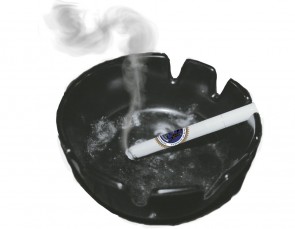
The Michigan House and Senate worked closely to propose new legislation that bans smoking in public places after an ongoing debate between restaurant owners, health activists and community members. On Dec. 18 Governor Jennifer Granholm signed the bill into law.
In a press release Granholm said, “This law shows that the health of Michigan citizens is a top priority. We will create more smoke-free environments with this law, which will lead to a healthier state.”
The law, named the Ron M. Davis Law, for the late chief medical officer of the Michigan Department of Public Health, will take effect on May 1, 2010, and will ban smoking in all bars, hotels, restaurants, public workplaces, and government buildings.
Michigan is the 38th state to pass legislation that places limitations on smoking in public places.
Kacey Gartland, a freshman in the pre-optometry program, thinks that the smoking ban is a good idea and supports it.
“If I go out and I’m in a smoky environment, I cough and have trouble breathing,” she said. “Now, I won’t have to worry about coming back smelling like smoke and possibly getting cancer from secondhand smoke.”
The ban exempts cigar bars, tobacco specialty stores, home offices, motor vehicles, and Detroit casino floors.
According to the Michigan Department of Community Health, in order to allow smoking as a cigar bar the establishment must make at least ten percent of its profit from the sale of cigars. The bill also prohibits more cigar bars from opening.
Hookah lounges may continue to allow smoking under the provision of specialty tobacco shops. One stipulation is that in order to be considered a tobacco specialty shop the business is not allowed to sell food or drink within the facility.
Tribal-run casinos are exempt because they are on sovereign land and are exempt from state laws. Detroit casinos are also excluded yet smoking will be prohibited within restaurants and hotels inside the casinos.
Tim Leggett, a manager at The Gate and 7-10 Bar and Grill, says that he expects that the new law will not greatly impact business long-term, but it may be hurt in the short-term.
“In the short run we are probably going to be affected because not as many people are going to want to come in because they cannot smoke,” said Leggett.
Originally, The Gate and 7-10 Bar and Grill had planned on constructing an additional patio to accommodate the smoking ban. However, the workplace ban does not allow smoking on an outside patio.
Because of this Leggett said, “We are a bit worried about the ban as of now and we are working on ideas on how to provide a place for smokers to enjoy themselves.”
Establishments that violate the new law will receive a $100 civil penalty for the first instance and up to $500 for any subsequent violations. Food service establishments that violate the law may be shut down until they comply.
Freshman Shane Dunbar said, “I feel that people are going to make a big deal about the whole thing. Establishment owners are going to have a problem because they may lose business because their customers want to be able to smoke.”
He believes that the decision should be left up to the individual establishment owners. “That’s why there are smoking and non-smoking sections,” he said. “There are also fans and air filters that can pull the smoke out of the air. There are other ways than a smoking ban.”
The new legislation stems from strong, long-term anti-smoking demands from health activists, healthcare officials, and non-smoking citizens.
